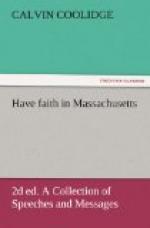But I should fail in my duty and neglect my deep conviction if I did not declare that in my day there was no better place to educate a young man. Most of them came with a realization that their coming meant a sacrifice at home. They may have lacked a proficiency in the arts of the drawing room which sometimes brought a smile; but no competitor met the Amherst men of that day on the athletic field or in the postgraduate school with a smile that did not soon come off. They had their pranks and sprees, but they had the ideals of a true manhood. They were moved with a serious purpose. He who had less lacked place among them. They are come and gone from the campus, those men of the early nineties, and with them went the power to command.
Those were days that represented especially the spirit of President Seelye. Under his brilliant and polished successor the Faculty changes were few. There was Professor Wood, the most accomplished intellectual hazer of freshmen. There was Professor Gibbons, who was strong enough in Greek derivation so that every second-year man soon had a clear conception of the meaning of sophomore. After demonstrating clearly that on the negative side the derivation of “contiguity” was not “con” and “tiguity,” he advised those who could not with equal clearness demonstrate its derivation on the positive side to look it up. There were Morse and Frink, Richardson, Hitchcock, Estey, Crowell, Tyler, and Garman. All these and more are gone. The living, no less eminent, I need not recall. As a teaching force, as an inspirer of youth, for training men how to think, that faculty has had and will have nowhere any superior.
“So passed that pageant.”
The college of to-day has taken on a new life, a new activity. Military training then was a spectacle for the Massachusetts Agricultural College. To-day Amherst welcomes its returning soldiers, and but a little time since divested itself of the character of a military camp to resume the wonted garb of peace. Yet it is and has been the same institution,—a college of the liberal arts. In this so-called practical age Amherst has chosen for her province the most practical of all,—the culture and the classics of all time.
Civilization depends not only upon the knowledge of the people, but upon the use they make of it. If knowledge be wrongfully used, civilization commits suicide. Broadly speaking, the college is not to educate the individual, but to educate society. The individual may be ignorant and vicious. If society have learning and virtue, that will sustain him. If society lacks learning and virtue, it perishes. Education must give not only power but direction. It must minister to the whole man or it fails.




